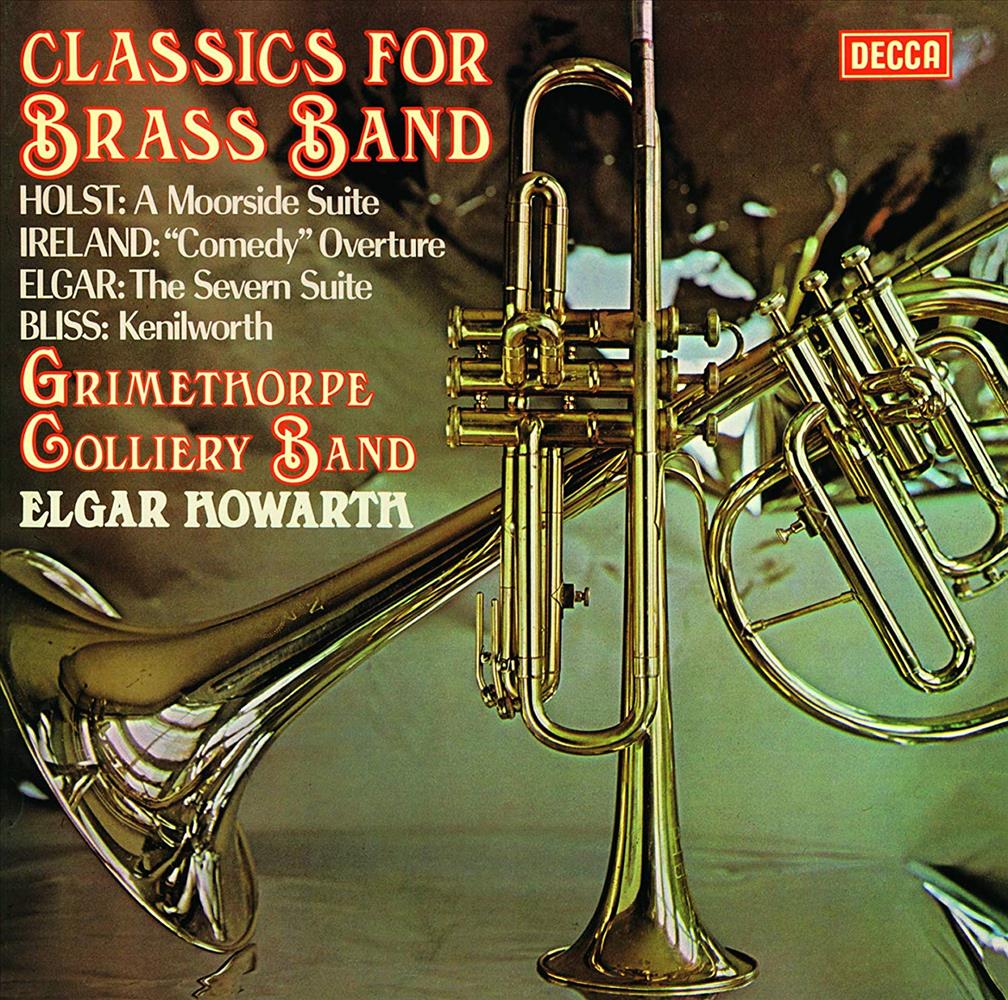

There was a time in the 1970s when LPs ruled the roost and brass band recordings were plentiful.
Even decent sized record shops stocked them, especially those on labels such as RCA or EMI. So when Elgar Howarth was driving Grimethorpe Colliery Band in new and exciting musical directions you eagerly awaited getting your hands on their latest release.
After the somewhat tongue in cheek ‘Pop Goes The Posthorn - When Elgar Howarth Meets the Grimethorpe Colliery Band’ in 1973, Howarth got down to some serious recording business.
He first reprised some of his lighter, cleverly constructed compositions and arrangements that brought success at the Granada Band of the Year contest in an album on Decca’s ‘Sounds of Brass’ series in 1976. It was followed by the challenging ‘Grimethorpe Special’ and ‘Classics for Brass Band’ on Decca’s classical label, both in 1977.
Defining release
42 years on, it remains a defining release - covering as it did, four major works for the genre from Holst, Ireland, Elgar and Bliss; ‘A Moorside Suite’, ‘Comedy Overture’, ‘The Severn Suite’ and ‘Kenilworth’.
Amazingly, it has just been reissued on CD by Universal (who now own Decca), in Japan, complete with booklet notes in Japanese. And thanks to the consumer phenomenon of Amazon and Ebay it is now available as an import to the UK.
The two major reviews of the original LP in 1977 (other than those of the banding media) illuminated just how much and yet, how little, the critics knew of brass band repertoire.
Malcolm MacDonald in the ‘Gramophone’ magazine had already covered several LP releases and was partially impressed: “Four of the classics of the brass band symphonic repertoire at a stroke; and a very good stroke it is” he said.
However, he was less than complimentary of ‘The Severn Suite’, despite saying that Howarth and Grimethorpe played it “for all it is worth”.
He added: “…perhaps the most unified, symphonic work for brass band in the repertoire. The best? No, I don’t think so: there are too many relatively feeble passages, some few fussy ones, and it is possible to feel that the climax comes too soon (in the second section).”
As for ‘Kenilworth’?
“If Bliss...seems to come off best, perhaps that is because it is the best music (or anyway the most suitable music)”.
No fan of vibrato (“their solo welcoming fanfares do wobble somewhat”) he did admit that this was somewhat acceptable, because, “...these are brass band players playing within their own context, not within the different contrast – to that of the string context of symphony players.”
Meanwhile, Lionel Markson, writing in ‘Records and Recordings’, was rather more explicitly condescending, describing the brass band as, “...essentially a proletarian phenomenon, providing a musical outlet for working men of limited educational attainment and little musical sophistication.”
Lack of knowledge
His lack of knowledge in describing John Ireland’s ‘Comedy Overture’ as, “a free adaptation of his ‘London Overture’, not as intricate as the original, but still challenging to brass players”, still brings a wry smile, especially as he digs an even deeper hole for himself by adding: “Inevitably Ireland’s brass band version of his Overture reduces the expressive range of the orchestral original.”
Markson was more praiseworthy of ‘The Severn Suite’, where “the players exhibit the velocity and the flexibility for Elgar’s brilliant ‘Toccata’, find a sustained grave legato for his fugal andante and invest the solemn ‘Coda’ with touches of pageantry.”
There was also a sympathetic response to Holst’s ‘A Moorside Suite’; “... it is splendidly played. I particularly enjoyed the crisp attack and blazing fortissimo tuttis in the March.” He describes the band’s playing as “at once brilliant and seemingly effortless.”
His lack of knowledge in describing John Ireland’s ‘Comedy Overture’ as, “a free adaptation of his ‘London Overture’, not as intricate as the original, but still challenging to brass players”, still brings a wry smile, especially as he digs an even deeper hole for himself by adding: “Inevitably Ireland’s brass band version of his Overture reduces the expressive range of the orchestral original.”
Seminal compositions
Despite that paternal snobbishness, over 40 years later the release remains both relevant and significant, especially if you read Elgar Howarth’s own analysis of the seminal compositions.
He concluded that the Holst was perhaps the most important piece in the brass band repertoire - “a minor masterpiece”, whilst the Elgar was the least understood and consequently the most under-rated. “It is in fact a flawed masterpiece,” he wrote. “...containing the greatest single movement yet written for band – the fugue”.
With the passing of time it is easy to forget the influence Howarth had in initiating a musical sea-change in the banding world – and especially in the context of his own deeply felt affection and respect for the traditional masterworks of our very specific genre.
He had no real need to record these pieces (they had been staples on other labels from other bands), yet here is the evidence to prove that he felt it necessary to leave his mark – eliciting performances of noble grandeur from a robust yet malleable band.
If you are interested in updating your collection and want to buy the CD then go to Amazon or Ebay. The prices have varied and there is an import fee and postage cost, so you are looking at £20 plus (the CD costs £14.29). The delivery time may be weeks rather than days.
It’s a hefty price, but well worth every penny to enjoy a slice of recording history.
Tim Mutum
To purchase:
https://www.amazon.co.uk/Classics-Brass-Band-Grimethorpe-Colliery/dp/B07JVF7L75/ref=sr_1_3?keywords=grimethorpe+band+classics+for+brass+band&qid=1561573139&s=gateway&sr=8-3
Play list:
1. A Moorside Suite (Gustav Holst)
2. A Comedy Overture (John Ireland)
3. The Severn Suite (Edward Elgar)
4. Kenilworth (Arthur Bliss)









